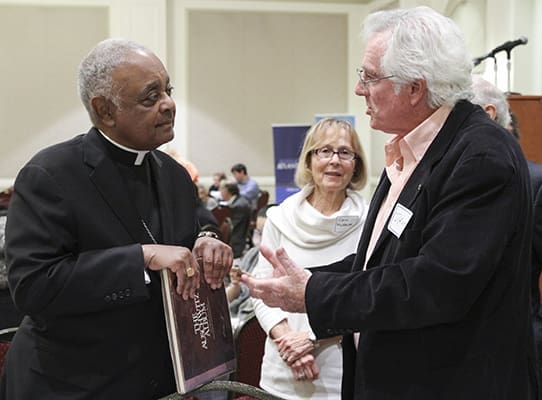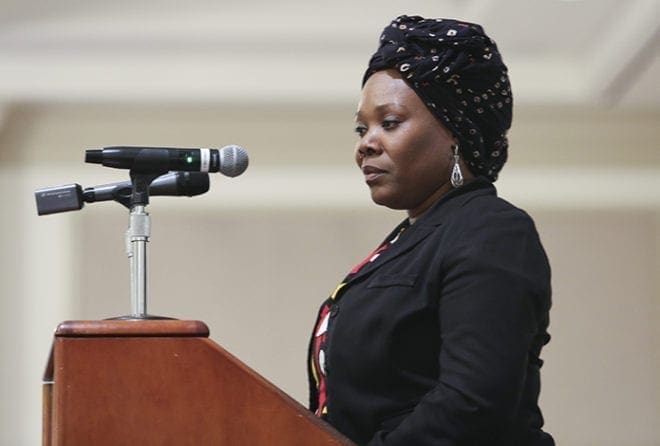Seated beside his wife Ronnesia, Joseph Barker II, center, shares some comments during the Oct. 26 community event at The Temple commemorating the 52nd anniversary of Nostra Aetate. Temple Emanu-El Senior Rabbi Spike Anderson, right, listens with other participants. Barker is the director of admissions at Cristo Rey Atlanta Jesuit High School. Photo By Michael Alexander
Atlanta
‘Repairing the World’ offers evening of perspectives, friendship
By NICHOLE GOLDEN, Staff Writer | Published November 2, 2017 | En Español
ATLANTA—More than 180 people gathered for an evening of discussion and forging new friendships Oct. 28 in celebration of the 52nd anniversary of “Nostra Aetate.”
“Repairing the World: Understanding Our Shared Responsibility,” hosted by the Archdiocese of Atlanta and the American Jewish Committee Atlanta Regional Office, was held at The Temple in midtown Atlanta.
Representatives of the Catholic, Jewish, Muslim and Protestant communities enjoyed an evening reception with speakers sharing perspectives and table discussion time afterward.
“Nostra Aetate” was the Second Vatican Council document that transformed the church’s approach to Judaism after centuries of troubled relations. Latin for “In Our Time,” “Nostra Aetate” repudiated the centuries-old deicide charge against Jews, stressed the religious bond shared with Catholics, clarified that there is no supersession of Judaism by Christianity and affirmed God’s covenant with the Jewish people.
Paula Gwynn Grant, director of communications for the archdiocese, introduced five speakers who offered different perspectives on the main topic, to spark thought and dialogue.
“Everyone has a perspective and that’s the beauty of tonight; we want to hear your perspective,” she told those gathered. “We are many different people with the one idea that we share a responsibility for peace.”
Speakers share experiences of intolerance
Leaders who shared at the event included Father Bill Hao, administrator of Holy Name of Jesus Chinese Mission in Norcross; Steve Berman, a member of the Jewish faith; Carmen Coya-van Duijn, a Latina Catholic; Jaasmeen Hamed, a Muslim; and Alan Cross, who is a Southern Baptist minister.
Father Hao, who is of Chinese descent and Filipino by birth, is an American citizen. The priest shared the struggles of the fledgling Chinese Catholic community in locating a property suitable for Mass and parish activities.
“We went through a lot,” Father Hao said. There was always “something lacking or not quite right” about prospective locations.

Prior to the “Nostra Aetate” anniversary program at The Temple in Atlanta, Dave Davis of All Saints Church, Dunwoody, right, presents a copy of “The Auschwitz Album” to Archbishop Wilton D. Gregory. Photo By Michael Alexander
The pastor called about a property for sale in Duluth, which had been a church. The woman on the phone questioned his ethnicity and then religion. After Father Hao answered that he was Catholic, the woman suddenly said, “Not for sale, not for sale.”
Although that was a negative experience, Father Hao said it was unusual.
“You know it’s very rare, in my personal experience, that I experience it,” he said of intolerance.
“Here’s the silver lining … I’m so glad that we found something better,” he said. “The property is really, really great. It gives us room to grow,” he said of their new church home on Light Circle in Norcross.
The pastor extended an invitation to all and briefly shared directions on how others could find their way to visit Holy Name of Jesus Mission.
“You’ll find me with my open arms,” said Father Hao warmly.
Atlanta businessman Steve Berman served on the steering committee organizing “Repairing the World.”
“Civility, morality, tolerance … these three words have never been more important than in the last three months,” he said.
It is well understood by the Jewish community that hate and bigotry affect not just one group, but all of society as a whole, emphasized Berman.
He said up until last year, many felt anti-Semitism was a problem for past generations. Berman said that nationwide an unprecedented spike in anti-Semitic acts has occurred in the U.S. during the past year.
“We saw an 86 percent surge in anti-Semitism in the first quarter of this year alone,” he said. “Words alone are hurtful enough, but public displays of anti-Semitism have emerged from the shadows.”
Posting of hate signs and swastikas “sensitize us to the fact that unfortunately our job is not done,” said Berman. “We have a lot to do.”
Astounding acts of hate and events such as the white supremacists’ rally in Charlottesville, Virginia, in August, underscore the importance of interfaith dialogue through programs like “Repairing the World,” said Berman.
“They send a clear message to the community that we expect and cherish civility and that our diversity makes us stronger and allows us to accept others,” he said.
It was a photograph of a child in “The Auschwitz Album” that propelled Ralph “Dave” Davis of All Saints Church in Dunwoody to a life in solidarity with the global Jewish community.
Davis, who attended the Temple event, brought two copies of the book that published the album’s contents. He presented one copy to Archbishop Wilton D. Gregory and the other to Dov Wilker, regional director for the American Jewish Committee Atlanta.
Lilly Jacob-Zelmanovic Meier, who survived the Holocaust, discovered an album of photos, the only photographic evidence of the process leading to the mass murder at the Auschwitz concentration camp.
Davis noticed a young girl in the book who reminded him of one of his daughters. She was pictured arriving at the camp with her siblings and a Christian nanny, although photographs had been forbidden.
“One photographer broke the rules,” explained Davis.
“The little girl did die,” he shared. The nanny also died at the camp, unwilling to leave the family for whom she worked.
The picture touched Davis so much that he made a trip to Poland to visit the memorial. “I went to Auschwitz for the very first time. This little girl brought me halfway around the world,” he said.
He developed a close friendship with Lilly Jacob and wanted to present the books at the event out of gratitude for the program of dialogue being made available.
‘You shall be a blessing’
When it was her turn to speak, Jaasmeen Hamed looked out across the room and acknowledged all the “people I’m looking forward to knowing.”
She shared that her Muslim faith requires her to seek and do the will of God in all things.
Rabbi Scott Colbert, rabbi emeritus of Temple Emanu-El in Atlanta, presented an inspiring reflection prior to table discussion.
He noted that those providing perspectives touched on the importance of forgiveness.
The rabbi shared from Genesis 12 when the Lord said to Abraham, “Go forth from your native land and from your father’s house to the land that I will show you … I will make your name great and you shall be a blessing.”
“We are all of the stock of Abraham in this room,” he reminded the group, and “you shall be a blessing. How shall we be a blessing?”
Rabbi Colbert has been working with other Jewish leaders and ministers from other faiths to address the rising tide of hate.
The rabbi noted that when people are mistreated, they pay attention but not always when others are being treated poorly.
He told attendees to resist that urge, particularly in recognizing the needs and problems of Muslims, Jewish people, Catholics, immigrants and their children at this time in America.
“Their problems are our problems,” he said. “These are truly complex issues in need of complex solutions. They call for our leaders, and they call for us to be creative and compassionate. And that is our job tonight.”
He asked those sitting at tables to begin a “holy discussion.”
“What we are doing is sacred,” said the rabbi.

Jaasmeen Hamed was the fourth of five community leaders who addressed the audience present at the Oct. 26 community event commemorating renewed dialogue and partnership between Catholics and Jews. Hamed represented the Muslim faith community. Photo By Michael Alexander
At table 22, near the back of the room, program participants of varying backgrounds and faiths began such a discussion. They spoke about how fear is often at the root of acts of intolerance or hate.
Participant Sandy Palay brought up the precept of treating others how one would want to be treated, the Golden Rule.
“That’s pretty central to all religions,” said Palay.
She admitted to her tablemates that she personally could do so much more to build bridges with others.
Rabbi Colbert offered a benediction, “We praise you, oh Lord our God, the sovereign of the world who has given us the ability to repair the world.”
Archbishop Gregory provided a reflection to close the evening.
“That is a great grace for all of us to be together as neighbors and friends and brothers and sisters,” he said.
It is concerning that some people don’t realize the world is in a broken state, said the archbishop.
“We believe that it’s broken in so many ways because the people in the world are estranged and frightened,” said Archbishop Gregory. “And that’s the healing and the reparation that needs to take place—the bringing together of the many different peoples and faiths and cultures and traditions that share planet Earth.”
He noticed that all of the speakers have been objects of scorn simply for being who they are. This scorn comes in regards to race, religion, culture, gender and age.
“You name it and people have been able to make us the object of scorn,” he said. “The response to scorn is to forgive. That’s the only antidote to scorn, forgiveness.”
Abraham is the patriarch of all the monotheistic faiths represented at the program, the archbishop reminded the gathering.
“Abraham represents the oneness of God in his trust in hearing God calling him from homeland” and to the Promised Land, said Archbishop Gregory.
“We should look more into the person of Abraham and his struggle, his willingness to listen to God even when it cost him, even when it cost him his security. He was a wealthy man in his land and God said give it up, ‘I’ve got something better.’”
Abraham’s willingness to trust and take a risk is “perhaps one of the most important things that we as people of faith can share,” he said.